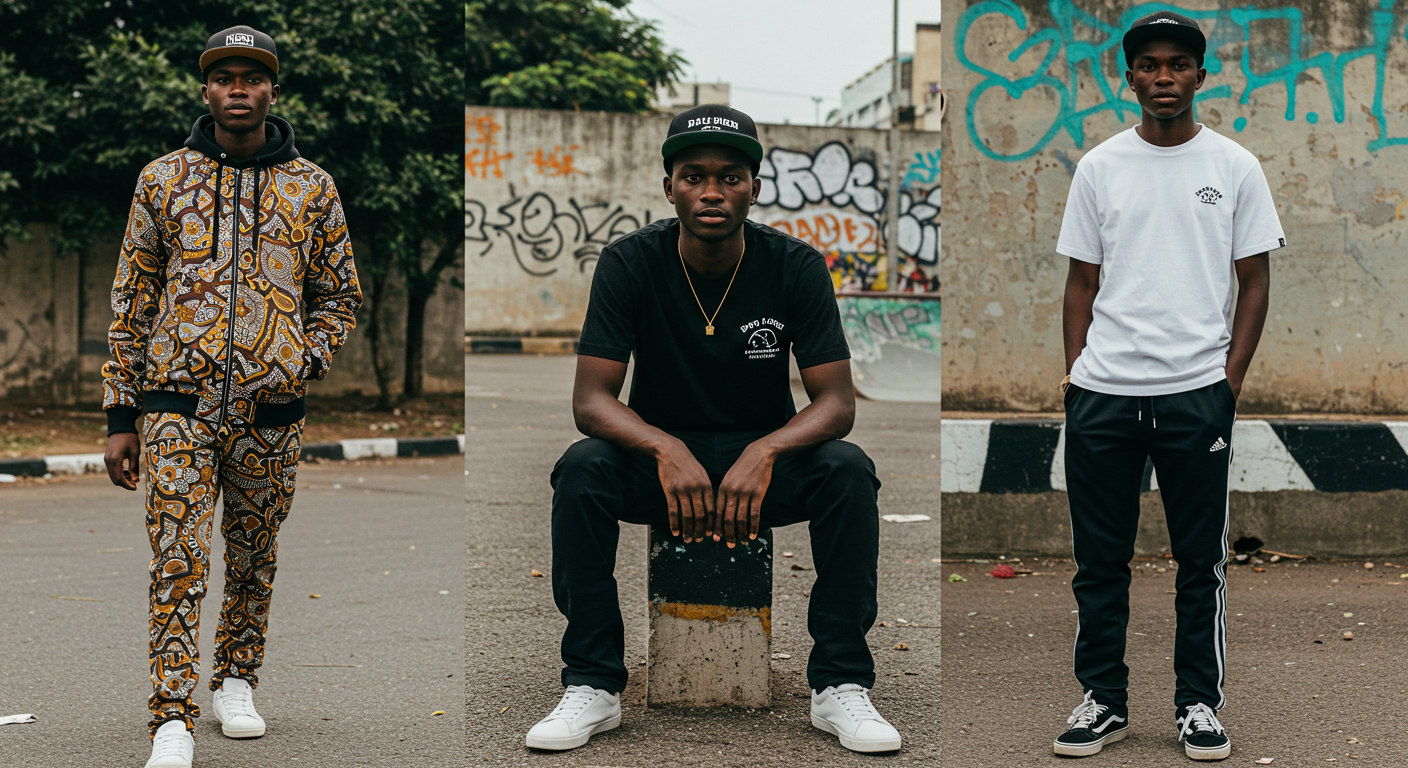Streetwear, once rooted in the sidewalks of New York and Tokyo, has evolved into a global cultural movement. And Africa is not just joining the conversation—it’s leading it with unapologetic creativity, cultural pride, and authenticity. From the skate parks of Lagos to the runways of Johannesburg, African designers are redefining what streetwear means and where it comes from.
Here’s a deeper look into some of the trailblazing streetwear brands that are shaping Africa’s fashion future and captivating global audiences in the process:
1. Daily Paper (Ghana/Somalia/Morocco – Based in the Netherlands)
Founded in 2012 by Jefferson Osei, Hussein Suleiman, and Abderrahmane Trabsini—three friends with African heritage—Daily Paper is a streetwear label that grew from a simple blog into a global fashion powerhouse.
Their collections are rooted in storytelling, often drawing inspiration from traditional African art, architecture, and customs. Think bomber jackets with Maasai-inspired prints or joggers that pay homage to Ghanaian kente. Yet, their pieces remain clean, modern, and wearable. Daily Paper is now stocked in top retailers worldwide, including Selfridges and SSENSE, and has collaborated with brands like Puma and Adidas.
Why they matter: They’ve proven that African heritage has global appeal when paired with strong branding and consistent creative vision.
2. WAFFLESNCREAM (Nigeria)
WAFFLESNCREAM, founded in Lagos in 2012, is more than a brand—it’s Nigeria’s first skateboarding and streetwear collective. Positioned at the intersection of fashion, music, and skate culture, this brand speaks directly to the Nigerian youth who’ve long lacked representation in global counterculture spaces.
Their designs are clean, often minimal, and loaded with subtext—subtle nods to Lagos life, rebellion, and independence. Through tees, caps, and hoodies, WAFFLESNCREAM gives voice to a new generation that embraces both local heritage and global street style.
Why they matter: They’re creating a subculture from the ground up, giving Nigerian youth a platform for self-expression outside mainstream narratives.
3. Rich Mnisi (South Africa)
A true creative force, Rich Mnisi launched his eponymous label in 2015 and quickly became a darling of the fashion world. Known for his bold designs, fluid silhouettes, and striking use of color, Mnisi pushes boundaries with each collection.
His work is a collision of futuristic fashion and African heritage. For example, his “Hiya Kaya” collection celebrated his Tsonga roots, blending traditional shapes and prints with high fashion drama. His gender-fluid pieces challenge norms, affirm identities, and reimagine what African luxury can look like.
Why they matter: Rich Mnisi is helping to blur the lines between fashion, art, and activism—bringing African stories to global fashion platforms with courage and flair.
4. Orange Culture (Nigeria)
Founded by Adebayo Oke-Lawal in 2011, Orange Culture is known for its vibrant, androgynous designs that defy stereotypes of masculinity and challenge fashion conventions in Nigeria and beyond.
Orange Culture’s aesthetic blends streetwear with high fashion—think sheer shirts, fluid pants, and dramatic prints—while embedding deep narratives around identity, gender, and self-love. The brand has shown at London Fashion Week and was a finalist for the prestigious LVMH Prize in 2014.
Why they matter: Orange Culture has carved out space for queer expression and alternative masculinity in African fashion, which is both bold and needed.
5. Maxhosa Africa (South Africa)
Laduma Ngxokolo’s Maxhosa Africa is a luxury knitwear brand that draws from the rich visual heritage of the Xhosa people. Originally inspired by the need for modern knitwear that Xhosa initiates could wear after their traditional rites of passage, the brand has since become a global fashion staple.
Maxhosa’s intricate patterns, luxurious textures, and unapologetically African designs have been worn by celebrities like Alicia Keys, Swizz Beatz, and Beyoncé. The brand is a visual celebration of African opulence and pride.
Why they matter: Maxhosa Africa challenges the Eurocentric norms of luxury fashion, proving that African craftsmanship can rival any of the world’s most iconic fashion houses.
6. 5K Limited (Kenya)
5K Limited is one of East Africa’s most exciting underground streetwear brands. Based in Nairobi, it reflects the city’s pulse—young, gritty, and unapologetically bold. Their tees and hoodies often feature sharp commentary on Kenyan society, touching on politics, mental health, and youth culture.
While still relatively under the radar globally, the brand has cultivated a loyal local following and represents a rising tide of East African streetwear designers claiming their space in fashion conversations.
Why they matter: 5K Limited gives voice to Nairobi’s creative youth—showing that streetwear is also a medium for activism and dialogue in East Africa.
Why These Brands Matter
African streetwear isn’t a trend—it’s a statement. These designers and collectives are:
Reclaiming narratives long shaped by colonial aesthetics.
Challenging stereotypes around gender, identity, and African fashion.
Creating platforms for youth culture, subcultures, and local pride.
Proving that fashion made in Africa is just as bold, relevant, and marketable as anything from Milan or Paris.
Their work is rewriting the rules and reminding the world that Africa is not only the cradle of civilization—it’s also the future of style.



